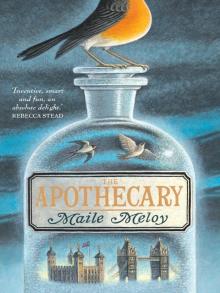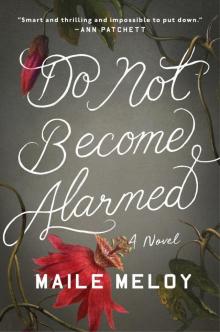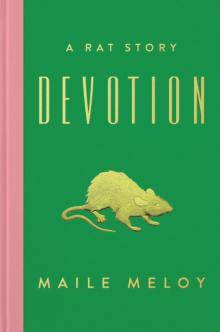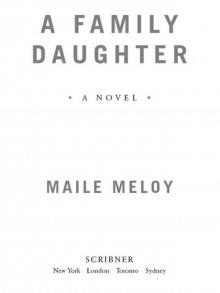- Home
- Maile Meloy
Both Ways Is the Only Way I Want It Page 2
Both Ways Is the Only Way I Want It Read online
Page 2
In the café, the waitress slid a burger and fries in front of Beth Travis and said, “The cook wants to know if that’s your horse out back.”
Chet said it was.
“Can he give it some water?”
He said he’d appreciate it.
“Truck break down?” the waitress asked.
He said no, his truck was all right, and the waitress went away.
Beth Travis turned the long end of the oval plate in his direction, and took up the burger. “Have some fries,” she said. “How come you never eat anything?”
He wanted to say that he wasn’t hungry when he was around her, but he feared the look on her face if he said it, the way she would shy away.
“Why were you afraid of selling shoes?” he asked.
“Have you ever sold shoes? It’s hell.”
“I mean, why were you afraid you couldn’t get anything else?”
She looked at the burger as if the answer was in there. Her eyes were almost the same color as her hair, and ringed with pale lashes. He wondered if she thought of him as an Indian boy, with his mother’s dark hair. “I don’t know,” she said. “Yes, I do know. Because my mother works in a school cafeteria, and my sister works in a hospital laundry, and selling shoes is the nicest job a girl from my family is supposed to get.”
“What about your father?”
“I don’t know him.”
“That’s a sad story.”
“No, it’s not,” she said. “It’s a happy story. I’m a lawyer, see, with a wonderful job driving to fucking Glendive every fifteen minutes until I lose my mind.” She put down the burger and pressed the backs of her hands into her eyes. Her fingers were greasy and one had ketchup on it. She took her hands away from her face and looked at her watch. “It’s ten o’clock,” she said. “I won’t get home before seven-thirty in the morning. There are deer on the road, and there’s black ice outside of Three Forks along the river. If I make it past there, I get to take a shower and go to work at eight, and do all the crap no one else wants to do. Then learn more school law tomorrow night, then leave work the next day before lunch and drive back here with my eyes twitching. It’s better than a hospital laundry, maybe, but it’s not a whole fucking lot better.”
“I’m from near Three Forks,” he said.
“So you know the ice.”
He nodded.
She dipped her napkin in her water glass and washed off her fingers, then finished her coffee. “It was nice of you, to bring the horse,” she said. “Will you take me back to my car?”
Outside, he swung her up onto the horse again, and she put her arms around his waist. She seemed to fit to his body like a puzzle piece. He rode slowly back to the school parking lot, not wanting to let her go. Next to the yellow Datsun, he held her hand tight while she climbed down, and then he dismounted, too. She tugged her puffy coat where it had ridden up from sliding off the horse, and they stood looking at each other.
“Thank you,” she said.
He nodded. He wanted to kiss her but couldn’t see any clear path to that happening. He wished he had practiced, with the high school girls or the friendly secretaries, just to be ready for this moment.
She started to say something, but in his nervousness he cut her off. “See you Thursday,” he said.
She paused before nodding, and he took this for encouragement. He caught up her hand again and kissed it, because he had wanted to do that, and it was soft and cold. Then he leaned over and kissed her cheek, because he had wanted to do that, too. She didn’t move, not an inch, and he was about to kiss her for real when she seemed to snap out of a trance, and stepped away from him. She took her hand back. “I have to go,” she said, and she went around to the driver’s side of the Datsun.
He held the horse while she drove out of the parking lot, and he kicked at the snow. The horse sidestepped away. He felt like jumping up and down, in excitement and anxiety and anguish. He had run her off. He shouldn’t have kissed her. He should have kissed her more. He should have let her say what she wanted to say. He mounted up and rode home.
THURSDAY NIGHT he drove the truck in, no cowboy antics; he was on a serious mission. He was going to answer her questions honestly, such as the one about why he didn’t eat. He was going to let her say the things she intended to say. He didn’t wait for the crowd to arrive before going into the classroom; he went in early and took his seat in the back. The class filled up, and then a tall man in a gray suit with a bowling-ball gut came in and stood behind the teacher’s desk.
“Miss Travis,” he said, “found the drive from Missoula too arduous, so I will take over the class for the rest of the term. I practice law here in town. As some of you know, and the rest of you would find out soon enough, I’m recently divorced and have some time on my hands. That’s why I’m here.”
While the man talked on, Chet got up from his seat and made his way up the aisle to the door. Outside he stood breathing the cold air into his lungs. He let the lights of town swim in his eyes until he blinked them clear again and climbed into the rancher’s truck. He gave it enough gas so the engine wouldn’t quit, and it coughed and steadied itself and ran.
He knew Beth Travis lived in Missoula, six hundred miles west, over the mountains, but he didn’t know where. He didn’t know where she worked, or if she was listed in the phone book. He didn’t know if it was he who had scared her off or the drive. He didn’t know if the truck would make it all that way, or what the rancher would do when he found out he’d gone.
But he put the truck in gear and pulled out of town in the direction he had three times watched the yellow Datsun go. The road was flat and straight and seemed to roll underneath the truck, dark and silent, through a dark and silent expanse of snow-covered land. He stopped outside of Miles City, and again outside of Billings, to hobble around on his stiffened-up leg until he could drive again. Near Big Timber, the plains ended and the mountains began, black shapes rising up against the stars. He stopped in Bozeman for coffee and gas, and drove the white line on the empty road past Three Forks and Logan, to stay out of the ice that spread from the shoulder in black sheets. Somewhere off to his right in the dark, his parents were sleeping.
It was still dark when he reached Missoula, and he stopped at a gas station and looked up “Travis” in the phone book. There was a “Travis, B.” with a phone number, but no address. He wrote down the number, but didn’t call it. He asked the kid at the cash register where the law offices were in town, and the kid shrugged and said, “Maybe downtown.”
“Where’s that?”
The kid stared at him. “It’s downtown,” he said, and he pointed off to his left.
Downtown, Chet found himself in dawn light among shops and old brick buildings and one-way streets. He parked and got out to stretch his hip. The mountains were so close they made him feel claustrophobic. When he found a carved wooden sign saying “Attorneys at Law,” he asked the secretary who came to open the office if she knew a lawyer named Beth Travis.
The secretary looked at his twisted leg, his boots, and his coat and shook her head.
In the next law office, the secretary was friendlier. She called the law school and asked where Beth Travis had gone to work, then cupped her hand over the receiver. “She took a teaching job in Glendive.”
“She has another job, too. Here.”
The secretary relayed this information on the phone, then wrote something down on a piece of paper and handed it to him.
“Down by the old railroad depot,” she said, pointing toward the window with her pencil.
He pulled up at the address on the piece of paper at eight-thirty, just as Beth Travis’s yellow Datsun pulled into the same parking lot. He got out of the truck, feeling jittery. She was rummaging in her briefcase and didn’t see him right away. Then she looked up. She looked at the truck behind him, then back at him again.
“I drove over,” he said.
“I thought I was in the wrong place,” she said. S
he let the briefcase hang at her side. “What are you doing here?”
“I came to see you.”
She nodded, slowly. He stood as straight as he could. She lived in another world from him. You could fly to Hawaii or France in less time than it took to do that drive. Her world had lawyers, downtowns, and mountains in it. His world had horses that woke hungry, and cows waiting in the snow, and it was going to be ten hours before he could get back to get them fed.
“I was sorry you stopped teaching the class,” he said. “I looked forward to it, those nights.”
“It wasn’t because—” she said. “I meant to tell you on Tuesday. I’d already asked for a replacement, because of the drive. They found one yesterday.”
“Okay,” he said. “That drive is pretty bad.”
“You see?”
A man in a dark suit got out of a silver car and looked over at them, sizing Chet up. Beth Travis waved and smiled. The man nodded, looked at Chet again, and went into the building; the door closed. Chet suddenly wished that she had quit teaching the class because of him, that he’d had any effect on her at all. He shifted his weight. She pushed her hair back and he thought he could step forward and touch her hand, touch the back of her neck where the hair grew darker. Instead he shoved his hands into his jeans pockets. She seemed to scan the parking lot before looking at him again.
“I don’t mean any harm,” he said.
“Okay.”
“I have to go feed now,” he said. “I just knew that if I didn’t start driving, I wasn’t going to see you again, and I didn’t want that. That’s all.”
She nodded. He stood there waiting, thinking she might say something, meet him halfway. He wanted to hear her voice again. He wanted to touch her, any part of her, just her arms maybe, just her waist. She stood out of reach, waiting for him to go.
Finally he climbed up into the truck and started the engine. She was still watching him from the parking lot as he drove away, and he got on the freeway and left town. For the first half hour he gripped the steering wheel so hard his knuckles turned white, and glared at the road as the truck swallowed it up. Then he was too tired to be angry, and his eyes started to close and jerk open. He nearly drove off the road. In Butte he bought a cup of black coffee, and drank it standing next to the truck. He wished he hadn’t seen her right away, in the parking lot. He wished he’d had a minute to prepare. He crushed the paper coffee cup and threw it away.
As he drove past Logan, he thought about stopping, but he didn’t need to. He knew what his parents would say. His mother would worry about his health, driving all night, her sickly son, risking his life. “You don’t even know this white girl,” she’d say. His father would say, “Jesus, Chet, you left the horses without water all day?”
Back at the Hayden place, he fed and watered the horses, and they seemed all right. None of them had kicked through their stalls. He rigged them up in the harness, and loaded the sled with hay, and they dragged it out of the barn. He cut the orange twine on each bale with a knife and pitched the hay off the sled for the cows. The horses trudged uncomplainingly, and he thought about the skittery two-year-olds who’d kicked him everywhere there was to kick, when he was fourteen. The ache in his stomach felt like that. But he hadn’t been treated unfairly by Beth Travis; he didn’t know what he had expected. If she had asked him to stay, he would have had to leave anyway. It was the finality of the conversation, and the protective look the man in the dark suit had given her, that left him feeling sore and bruised.
In the barn, he talked to the horses, and kept close to their hind legs when he moved behind them. They were sensible horses, immune to surprise, but he had left them without water all day. He gave them each another coffee canful of grain, which slid yellow over itself into their buckets.
He walked back outside, into the dark, and looked out over the flat stretch of land beyond the fences. The moon was up, and the fields were shadowy blue, dotted with cows. His hip was stiff and sore. He had to pee, and he walked away from the barn and watched the small steaming crater form in the snow. He wondered if maybe he had planted a seed, with Beth Travis, by demonstrating his seriousness to her. She wouldn’t come back—it was impossible to imagine her doing that drive again, for any reason. But she knew where he was. She was a lawyer. She could find him if she wanted.
But she wouldn’t. That was the thing that made him ache. He buttoned his jeans and shifted his hip. He had wanted practice, with girls, and now he had gotten it, but he wished it had felt more like practice. It was getting colder, and he would have to go inside soon. He fished her phone number out of his pocket and studied it a while in the moonlight, until he knew it by heart, and wouldn’t forget it. Then he did what he knew he should do, and rolled it into a ball, and threw it away.
THE SUMMER SHE TURNED FIFTEEN, Sam Turner took her last float trip down the river with her father. It was July, and hot, and the water was low. Hardly anyone was on the river but them. They had two inflatable Avon rafts with oaring frames—Sam and her father in one, her uncle Harry and a client from Harry’s new law firm in the other. In the fall, she would be a sophomore, which sounded very old to her. She’d been offered a scholarship to a boarding school back east, but she hadn’t officially accepted it yet. Applying had been her father’s idea, but now he looked dismayed every time the subject came up. Everyone said what an opportunity it was, so much better than the local schools, but neither of them could bring themselves to talk about it.
Sam had been down the river every summer for as long as she could remember—in a dozen rainstorms, and in hot sun that burned the print of swimsuit straps into her shoulders. Harry, her father’s younger brother, sometimes brought his friends, who passed the bottle of schnapps to her when her father was away from the campfire. She liked the smell better than the burning taste. She knew all the campsites and the cliff-shaded turns of the river, and the long flat stretch through pasture at the end. It was a four-day float trip, or five if you dawdled, or three if her father had to get back to work.
Her uncle’s client was the reason they were on the river so late, when it was all sandbars and rocks. Sam hadn’t been told that exactly, but it was the feeling she got—that they were going for this client. He had come from somewhere else, and was staying in Montana only for the case. She met him at the put-in, unloading the gear. Harry introduced her as his niece.
“You got a name?” the client asked.
“Sam,” she said.
“Layton,” the client said. He was younger than her uncle, and he wasn’t tall, but he was big in the chest and arms. He set a full cooler on the ground and put out a hand to shake hers.
“God, I like being up here,” he said. “I’m part Crow, part Blackfoot, part Sioux, I think. Part Jewish.” His eyes were blue. He let her hand go. “You have perfect teeth,” he said. “Did you have braces?”
“No,” she said. She was awkward at fifteen, and praise made her suspicious.
Layton said, “This is gonna be fun.”
Her father and Harry drove both empty trucks downriver to the place they’d take out three days later, to leave one and bring the other back. Sam stayed with the boats, and Layton volunteered to stay with her—to keep her safe, he said. They sat on the bank with the gear, sliding the coolers along the grass as the sun moved, to keep them in the shade. Sam was reading The Thorn Birds, bought at the supermarket along with the ice and groceries on the way out of town.
“It’s not on your reading list,” her father had said, dropping it in her lap in the truck. “But it’s the best thing they had.”
The boarding school had sent her a summer reading list with thirty books on it, books like The Portrait of a Lady and Tender Is the Night, but in her reluctance she’d forgotten to bring one along.
Layton took out a shotgun, to clean and oil it. “I bet you’re a crack shot,” he said. “Montana girl like you. I bet you’ve got your own guns.”
Sam shook her head and kept reading. He brought the gun
over to show her the sight, which was just a notch of steel on the barrel. He crouched close to her shoulder and she could smell the oil on the gun.
“You don’t need a fancy sight for a shotgun,” he said. “You ever fire one?”
“No,” she said. Her father had guns, but he hadn’t been hunting since her mother died. Sam barely remembered her mother; she’d hit black ice driving to Coeur d’Alene when Sam was four. She sometimes wondered if her father had quit hunting because he’d been busy taking care of her, or if he’d just stopped liking to shoot things.
“Ho, boy,” Layton said. He stood up. “We gotta take care of that. Get you a pheasant.”
“It isn’t bird season.”
“No one’ll know out here,” he said. He ran a cloth over the barrel.
“There are houses on the river,” she told him. “It’s not very remote.”
Layton laughed. “Remote. That’s a good word.”
She felt her cheeks heat up, but didn’t say anything.
“I don’t need very remote,” he said. “Just a little remote.”
Sam knew that her father wouldn’t tolerate poaching, so she left it for him to take care of. But when he and Harry drove up, her father just looked hard at the shotgun and started loading his boat.
They put in that afternoon, and in spite of the low water they got to the first campsite before dark. Her father had a two-man tent for himself and a burrow for her—a waterproof sack just big enough for a sleeping bag, with a mosquito net at the top. She set up the burrow with her sleeping bag inside, and Layton and Harry built a fire and talked about the case.
Harry was childless, and had been jobless on and off. He had always seemed to take pride in being the wild younger brother—Sam’s father was a district judge—but something had come over him a few years ago, and he had gone to law school and managed to pass the bar. He was a big man with a belly, and everyone liked him. He was trying to get out of debt, and the lawyer he had joined up with had given him Layton’s case.

 The Apothecary
The Apothecary Both Ways Is the Only Way I Want It
Both Ways Is the Only Way I Want It Do Not Become Alarmed
Do Not Become Alarmed Devotion: A Rat Story
Devotion: A Rat Story A Family Daughter
A Family Daughter